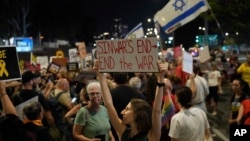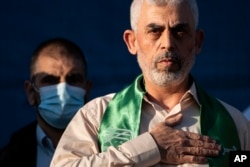The killing of Hamas leader Yahya Sinwar after what appears to have been a chance encounter with Israeli forces has sparked renewed hope in Washington that the conflict that has ravaged Gaza and set the Middle East on the brink of a regional war could give way to a potentially peaceful resolution.
In the hours following Israeli confirmation of Sinwar's death Thursday, in fighting that took place a day earlier, top U.S. officials praised the development as a significant counterterrorism achievement.
"This is a good day for the world," President Joe Biden told reporters, shortly after arriving in Berlin for meetings.
But the U.S. president also said it was time to "move on," for Israel to end the war, and for the hostages to come home.
In a separate statement, U.S. Secretary of State Antony Blinken called Sinwar, the architect of the October 7, 2023, terror attack that killed some 1,200 Israelis, "vicious and unrepentant." He said, "The world is a better place with him gone."
Yet Blinken also promised that the United States "will redouble its efforts with partners to end this conflict, secure the release all hostages, and chart a new path forward" for the people in Gaza.
Charting that new path, however, promises to be challenging.
"In the short term, this will create, I believe, a degree of chaos on the ground," said Ghaith Al-Omari, a senior fellow at the Washington Institute for Near East Policy and a former negotiator for the Palestinian Authority.
"Sinwar was a unique leader," Al-Omari said. "Hamas doesn't have anyone who can fill that particular role."
Al-Omari and other former officials say the list of possible replacements is short.
One possibility is Sinwar's brother Mohammed, though some experts think he is too weak to be able to grab control of the entire terror organization.
A more likely candidate, they say, is Khaled Mashaal, a high-ranking and well-known Hamas official in Doha, Qatar. Another possibility, though less likely, is Khalil al-Hayya, who has served as a Hamas negotiator.
Both might be open to ending the war.
"They are more keen on, let's just say, cashing in and getting what they can and reaching a deal and trying to get some benefits from it," Al-Omari said, noting there is a catch. "Their ability to actually produce change on the ground [in Gaza] is limited."
Still, their potential willingness to deal is a marked departure from Hamas' stance under Sinwar.
"He [Sinwar] was blocking all paths to any agreement," a former Israeli security official told VOA, speaking on the condition of anonymity to discuss the developments.
U.S. officials have expressed similar sentiments. But many have also expressed repeated concerns about Israel's readiness to come forward with plan for the "day after" fighting in Gaza ends.
"We're continuing to talk with our Israeli counterparts in terms of what that would look like," Pentagon spokesperson Major General Pat Ryder told reporters Thursday. "Certainly, it will be a complex undertaking."
One concern is that Israeli Prime Minister Benjamin Netanyahu may want to continue to press his military advantages against Hamas in Gaza as well as against the Hezbollah terror group, to the north, in Lebanon.
"The way the Israelis have been on the offensive in both Gaza and Lebanon, I don't think Netanyahu is going to stop anytime soon," Colin Clarke, director of research at the global intelligence firm The Soufan Group, told VOA.
"I expect it [Sinwar's death] to be important in degrading Hamas, but I doubt it will impact conflict resolution at this stage," he added.
Others are more hopeful.
"Now Israel has what they always needed," former U.S. Middle East envoy Dennis Ross said. "What they always needed, at least at one level, was going to be some manifestation of having won. And it's not just the destruction of the of the military, of Hamas or the military infrastructure. It was also that you had to get the guy who was responsible for doing it in the first place."
But even Ross, like Al-Omari now a senior fellow at The Washington Institute for Near East Policy, worries a cease-fire deal that sees the return of the Israeli hostages still held by Hamas, could be derailed by the lack of a "day after" plan and the absence of any credible authority on the ground.
"Frankly, the only option here is the Palestinian Authority," Ross said, referring to the Palestinian body that governs in the West Bank.
"There won't be another answer," he said in response to a question from VOA, warning the alternative is "a vacuum that will be filled by the worst forces, including Hamas, being able to make a comeback."
For some current and former Western officials, such a scenario remains a distinct possibility.
Sinwar's death is a "a major blow" to Hamas, said Edmund Fitton-Brown, a former senior United Nations counterterrorism official who currently serves as a senior adviser for the Counter Extremism Project.
Only it is not a certain death blow for the Gaza-based terror group.
"It may be that Hamas' status as top dog is less clear. But no other group is in a position to seize that position," Fitton-Brown said. "It might lead to fragmentation of Palestinian extremists with unpredictable results."
That could include ongoing fighting in Gaza.
"I would expect a low-level insurgency to continue," said Jonathan Schanzer, senior vice president for research and Middle East scholar at the Washington-based Foundation for Defense of Democracies.
"There will likely be pockets of resistance by Hamas or perhaps Hamas-aligned fighters," Schanzer told VOA. "There is probably still a somewhat large supply of young men in tracksuits willing to pick up AK-47s and fight either in the name of Hamas or in the name of something that is perhaps aligned with Hamas notionally."
Just how many is a concern for Israeli and U.S. officials.
"Hamas has been incredibly degraded," the Pentagon's Ryder said Thursday. "[They] certainly do not resemble anything close to what they were on October 7."
Some analysts estimate that of the 24 battalions Hamas commanded when it launched its terror attack on Israel last year, 23 have been destroyed. And Israeli officials claim to have killed about 17,000 Hamas fighters since launching their operation into Gaza.
But declassified U.S. intelligence estimates, from just last month, put the number of Hamas fighters at "probably ... fewer than 20,000 fighters," down from 20,000 to 25,000 a year earlier.
In addition to Hamas, U.S. intelligence in the past raised concerns about a dozen other militant groups in Gaza, including Palestinian Islamic Jihad, which at times have worked to bolster Hamas' efforts.
There are also questions about how Iran may react now that it has seen Israel degrade two of its more prominent regional proxies in Hamas and Hezbollah.
Earlier this month, Tehran launched approximately 200 ballistic missiles at Israel in retaliation for Israeli operations that killed other Hamas and Hezbollah leaders.
Israel's prime minister promptly warned Iran that it "will pay" for the attack, and Iranian officials have been bracing for Israel's response ever since.
"All eyes will be on Ali Khamenei, the supreme leader," said Schanzer. "He'll be in a position where he has to respond. Is it just simply a day of mourning and vowing to destroy Israel, or is there something more specific that he conjures up?"










